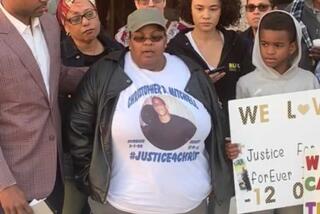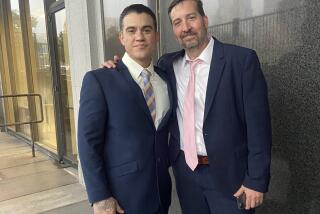Rape Charge Dropped in Skateboarder Murder Case
The attorney for Mark (Gator) Anthony, a nationally renowned skateboard champion accused of killing an aspiring model and burying her body in the desert, succeeded Wednesday in having a rape charge dismissed on technical grounds.
At a hearing in Superior Court in Vista, Judge Allan J. Preckel ruled in favor of Anthony and Deputy Public Defender John Jiminez, saying the lesser charge lacked sufficient evidence to be evaluated at trial as a separate and distinct conviction.
However, the more serious charge of first-degree murder remains, as does the special circumstance of “murder in the commission of a rape,” an allegation that permits prosecutors to seek the maximum penalty, life in prison without parole.
Anthony, 25, remains in County Jail in Vista. Bail has been set at $1.5 million.
Deputy Dist. Atty. Greg Walden said he was surprised by Preckel’s ruling but added that it fails to weaken the prosecution’s case “by any stretch of the imagination. We were most concerned with the special circumstance.”
In other words, he said, the judge’s ruling means prosecutors may now pursue rape as an allegation but only in the context of a murder bearing a special circumstance.
Walden credited Proposition 115, a 1990 initiative designed to speed court procedures and impose tougher sentences, with having a direct bearing on Wednesday’s ruling.
“What the Legislature and the people decided with Proposition 115 was to take away the benefits that fiends and animals, such as Mr. Anthony, derive from the law,” Walden said. “Just because Jeffrey Dahmer (an alleged serial killer in Milwaukee) and Mark Anthony have figured out ingenious ways of disposing of bodies--and thus reducing or eliminating evidence--doesn’t mean they earn a benefit in the eyes of the law.
“Proposition 115 allows us to charge a special circumstance without having the best physical evidence, en route to the death penalty or life in prison without parole.”
Anthony, a skateboarding star turned born-again Christian, is accused of binding the hands and feet of 22-year-old Jessica Bergsten to his bed, raping her for three hours, then striking her repeatedly with a steering-wheel locking device.
When she cried out for help, he became concerned that neighbors in his Carlsbad condominium complex might hear, authorities allege, so he placed her in a surfboard bag and strangled her. He then loaded the body in the trunk of his car and drove east, police say.
After burying Bergsten in the Imperial County desert, Anthony headed north to Phoenix, throwing evidence out the window as he drove, police say, and leaving the shovel used in the burial in a downtown trash bin. Police testimony indicates that, upon returning to San Diego County, he sought to eliminate even more evidence.
Prosecutors say that, seven weeks after the slaying, Anthony turned himself in to San Diego police May 8 and led Carlsbad investigators to Bergsten’s shallow grave near Ocotillo.
In a previous hearing, Carlsbad Police Detective Richard Castaneda told the court that Anthony detailed the killing in a taped confession.
Castaneda said that, a week before the slaying, Anthony drove to Temecula in an unsuccessful attempt to kill his ex-fiancee, Brandi McClain, because of her refusal to undergo a religious conversion and because she and another man had engaged in sex.
Prosecutors allege that Anthony blames Bergsten for breaking up his relationship with McClain. They see the crime as being motivated by revenge.
Anthony, who once earned a reported $200,000 a year in prizes and commercial endorsements as a skateboarding star, has since been sued in a $10-million civil action by the victim’s parents, Stephen and Kay Bergsten of Tucson. Despite Wednesday’s ruling, Walden, the prosecutor, said that Anthony not only raped Bergsten, “he did everything you can think of in a sexual way, in an effort to humiliate her.”
Jiminez, Anthony’s attorney, said his client made a “statement” to police, “not a confession,” and that the word rape “never once appears” in the transcript of the taped interview.
“There was some consensual sexual activity between the two,” Jiminez said. “I can tell you from listening to the transcript, the word rape is never used, even by police.”
Asked if Anthony murdered Bergsten, Jiminez said, “There may be some indication that she died in his presence. But there’s no indication of what type of sexual activity went on.”
Jiminez said Wednesday’s ruling gives the jury--in a trial set for early October--”one less thing to think about. The allegation of rape as a special circumstance still exists; but, as a separate charge for which he could be separately punished in a consecutive sentence, that’s been eliminated. So it makes it a little easier for me.”
Dressed in a crisp white shirt and black coat, and handcuffed to the chair he sat in, Anthony stared intently at the judge. Upon leaving the courtroom, he smiled to half a dozen well-wishers, who rushed outside to talk with Jiminez after the ruling.
The defendant is “in a very positive state of mind,” his lawyer said, “and believes that he has tried to cooperate with the police in a way that allowed these skeletal remains (Bergsten’s) to be identified. He feels his cooperation has been misused and abused by the police.
“He believes he has done the appropriate thing--that, in the end, the truth will come out, and that God is protecting him.”


